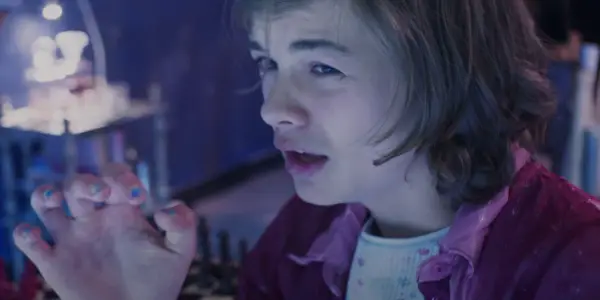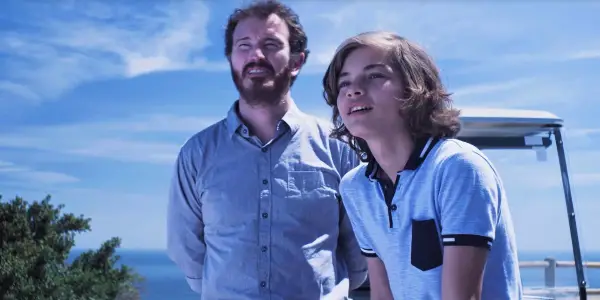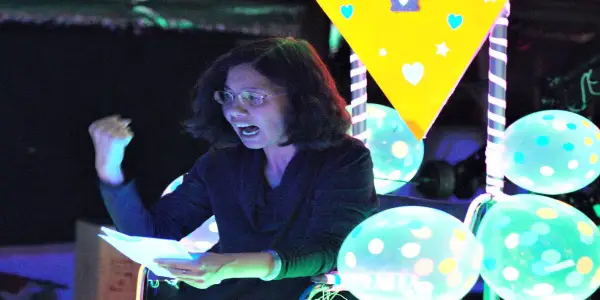Interview with Filmmaker Dana Ziyasheva for GREATLAND

Jacqui Blue has a lifetime background in theater and writing.…
Dana Ziyasheva wrote and directed a bright and colorful film with a sinister twist called Greatland. Greatland was released in 2020 and includes a strange election, a deadly virus and a culture shock. The film’s writer and director took the time to talk with us about her story and vision.
What inspired the story of Greatland? And what inspired this weird world?
I wanted to demonstrate how the power of suggestion can alter our perception of reality. Greatland is a snapshot of today’s Zeitgeist. For the last 30 years, I lived and worked in more than 80 countries: in a way, Greatland is my conclusion of where we are as a civilization.
The idea of colorful posters hiding human misery comes from the construction boom in China, where a shiny banner of the futuristic shopping mall would hide squalid temporary dorms for construction workers. In Greatland, though, posters disguise an old crumbling infrastructure. Los Angeles teems with decaying post-apocalyptic spaces. Throw over it a Burning Man’s artsy feel, and it becomes the birthplace of love and endless course of fun.
I am an active member of cat-lovers’ groups on Facebook, TikTok and Instagram. We constitute a substantial share of the world population. Pets are a shortcut to social media fame, endorsements and endorphin. Cats and dogs have successfully run for mayors in California, Kentucky, Minnesota, Alaska, Michigan and Texas. In Greatland, cat worshippers and dog fans are organized into Woof and Felinist parties and vie for the Sweetheart title.
The Evil Nation is based on the Regan’s Empire of Evil and George Bush’s Axis of Evil. The vision of impending global Apocalypse triggered by a common enemy is my Cold War atavism that comes on the heels of the Islamic terrorism threat and the recent “Chinese virus.”
Greatland is a green, no-car society. The only vehicle, the Fun Machine, is driven by Optimists, the de facto forces of law and order. That was inspired by my visits to North Korea where the few cars circulating on empty streets belonged to the government. When the mobility of citizens is restricted, they are less likely to assemble and plot to overthrow the government. Interestingly enough, the same fear prompted Haussmann’s renovation of Paris.
Greatland looks funky, low-tech, run down, cheap and malfunctioning because everything is either made by S.L.A.V.E. labor or imported from Evildom. The seizure-inducing neon hysteria of Bracelet TV broadcasts is, in fact, a mass brain neuro-programming of Greats. There, I took a page from TikTok and Nicki Minaj’s playbook.
Although I can explain the genesis of every element, I’d rather leave it up to the audience to peel off the layers of Greatland, to discover what’s underneath. Let’s just say, Greatland is a synthesis of the most ostentatious and subversive trends taken to the extreme.

How did you develop the character arcs when writing this script? What did you have in mind when writing these characters?
My sons inspire me a lot. I see how they play the social game. They nod and agree with whatever they’re told, and then they go and live their life the way they see fit. I did the same when I was their age and the school, TV and giant street banners were telling me that we are one happy socialist society on the way to Communist paradise.
Was the script written before 2020 and if so, did you have some insight as to what might be heading our way?
The script was written in 2017. Back then, I needed an imaginary threat from an evil nation, and the idea of the Virus appeared by itself. What needs to be taken into account is that I lived through the collapse of the Soviet Union. The majority of the population didn’t see it coming. However, looking back now, I realize the signs were there all along. In Greatland, Clerk says: “The social peace is fragile, replenishment of the population an issue. Greatland has lost its economic and technological advantages to Evildom.” Watch the Alpha Altruist’s reaction, and if you don’t get a feeling of déjà vu, you were not listening to the news the entire 2020.
As an artist, what was behind the decision to make Greatland so bright and colorful? What inspired the set design?
I wrote a detailed guide on the production design and graphic identity of Greatland. Boys wore pink; girls wore blue. Mother communicates with her Great children through a bracelet using traffic lights signalization. Hearts, rainbow, and unicorn emojis are the go-to symbols. For the Bracelet TV audience, our Academy award-winning make-up artist-designed fantastic face paints by mixing Woof Party and Felinists symbols with Peking Opera facial masks and playing a clever game with fluoresces.
Repentance Island has a cold, natural palette: blue like sky and sea, and white like seashells and marble statues in reference to ancient Greek culture (it’s the story of Ulysses after all) and understated beige and gray dress code. Because of budget limitations, we filmed Repentance Island in Catalina island in California instead of a posh Mediterranean city in Europe. So, Repentance island with its crowd of decrepit bougie boomers conveys the idea that true refinement and aristocracy of the spirit in Greatland are long gone.
Why did you choose to go with a Universal Mother? And does that make all the citizens of Greatland inbred and somewhat an act of incest as implied when Ulysses mentions his rabbit son is also his brother?
For Ulysses, Mother is real. She is his mom. Mother assures Ulysses that her hurting him comes from the place of love and care. The castrating mother figure was chosen for its subversive nature that evokes soft totalitarianism.
Since natural reproduction is taboo, the sperm collected during the Dark Temple ceremonies is used to impregnate S.L.A.V.E. women. Surrogate babies are distributed at random. Patrick and his tree wife Jolly were issued a “real” human kid to take care of. Ulysses got a rabbit because Mother had to come up with something quickly, on the spot, to divert his attention.
Unaware of this cruel population replenishment technique, Greats believe that every being in Greatland, be it a human, a plant or an animal is birthed by Mother. “That’s what makes us brothers and sisters”, Priest says. Ulysses calls the rabbit his son and “technically” a brother because he thinks that Mother made the rabbit with his ‘Life Force’. To him, it’s incest but we do understand that a human boy and a rabbit can’t be inbred brothers because a wristwatch says it birthed them both, right?

You have a lot going on in this world, why did you choose to make a story that is so busy rather than focus on one main plot, like the election, the virus, or the saving childhood best friend?
This is the coming-of-age story of Ulysses, a regular apathetic non-binary teenager. We see Greatland through his eyes. Like most of us, Ulysses is ideologically compliant with Mother as long as she provides him with food, housing, and Optimism. Ulysses starts paying attention to the system when it goes after the people he cares about. He has to choose between giving up a person he likes, or fight the circumstances to be with this person. After he makes this choice, he’s taken to the next level of understanding the system. This is when the polarity of the movie and Ulysses’ trajectory flip.
Did you at any point think you were giving the audience too much to chew?
I knew Greatland would be a challenge for some members of the audience. The world-building and story development happen simultaneously. Greatland relies heavily on metaphors and classic literature. It does not hammer a specific message into your head but rather expects you to read between the lines and walk a certain mental distance on your own. Judging by the response, some critics and viewers did just that and were blown away. Others gave up early, got mad, and called the film nonsensical.
Because it’s a feature and not a series, we could only show the tip of the iceberg of the complex construct that is Greatland. Details in every scene give you insights into Great mentality. For example, in the Dark Temple Ceremony, instead of providing his sperm, Ulysses fills the container with his phlegm. Priest accepts the container although he knows that Ulysses cheated. As an ‘employee’ of the Dark Temple, Priest must collect a certain amount of ‘Life Force’ per day to earn his Tokens of Love (Greatland’s currency). The quality of ‘Life Force’ is not his concern. It shows Greatland as rather loose, not straightforward oppressive society. You can wing it sometimes but not when it matters.
Why were some characters married to non-humans in this world?
Greats don’t discriminate against non-humans. Mother says, “Greats love everybody and everything.” People, animals, plants and insects are all equal citizens of Greatland which makes inter-species marriages and synthetic food a reality. What’s interesting is to see, later in the movie, how those who encourage inter-species unions, build their own relationships.
What is the main takeaway you hope the audience leaves with after watching Greatland?
I hope the audience sees the ‘divide and conquer’ tactics by Altruists of this world and how absurd it is to keep shouting at each other from opposite corners of the room. If we don’t come together and find a compromise and a meaningful way forward, Greatland would become a reality.
How did you pitch this film to investors and find backing for Greatland?
The sheer fact that Greatland was made in this day and age is a miracle. It is a film d’auteur that doesn’t take sides. Few in today’s world are willing to go beyond party affiliation to address a bigger systemic issue which is what Greatland is about. If you look back at Green Soylent, Brazil, or The Clockwork Orange – dystopian films are subversive and anti-system by nature. Satire-wise, in Greatland we went where no one dares to go, so the project was pure nitroglycerin. Igor Darbo had guts and vision to bring Greatland to life. If the film is not censored or taken down, it could give courage to other film-makers and producers. A growing number of private investors is interested in making bolder type of films, especially in this period when Hollywood seems to be at the end of a cycle.
How were you able to get name talent attached to your screenplay?
In his interview with Dread Central, Bill Oberst, Jr. who plays the Philanthropist in Greatland, said this: “I got a call from my agent with an offer. I said, “What’s the role?” She said, “The Philanthropist. He’s gaunt, has bad skin, speaks Shakespearean gibberish, and loves c*ckroaches.” I was like, “Check. Check. Check. And CHECK!”
What, if any, challenges and obstacles did you face when making this film?
I wish I had a bigger monitor during the production: I could barely see actors during the takes😊.
Building an alternate world and taking an original high concept off the ground on a budget was the biggest challenge. One day we had minors, animals, a stunt team, VFX coordinators and name actors working on set in a very expensive location and I had to make hard choices under extreme time pressure.
I have an intense fear of dogs since childhood but, for indie movie art’s sake, had to navigate my way around fighting, rescue, and emotional support canines. To give you an example, at an independent contractor home, a very old blind dog would bark at the slightest movement I made so I had to sit still for hours on end. Try to have your creative juices flowing, when a Gremlin-like creature (because that’s how it looked) stares at you with its foggy white eyes, licks its balls, and vomits putrid hairballs. Still, it was nothing compare to three mastiffs that guarded a house of the editor of my previous movie “Defenders of Life” in Costa Rica.
What were your most memorable moments from making this movie?
Staging a cycle of three fights in one afternoon: the first was a slasher-style butchery, the second had all makings of a full-on civil war and the third was the suppression of a riot styled after Béjart’s choreography of Ravel’s Bolero.

What did you learn when making this project?
I learned to communicate my vision effectively to every department and in the case of location scouting and casting, do a lion’s share of it on my own. I educated myself on the technical side of production design, VFX and graphics, sound, and music. As a former UNESCO Adviser for Communication and Information, I already knew about CGI and immersive digital environments. However, it was a whole new experience to actually collaborate with digital artists in Los Angeles, in Canada, Romania, Bangladesh, and India on enhancing and transforming shots from my own movie.
Are you satisfied with the final cut of the film? Is it what you envisioned it would be?
I think we got the best out of the footage. We had an Academy Award-winning editor advising us. I logged all seventeen Terabytes myself and worked on a rough cut and final cut with two other editors. I pretty much knew where we were at every step of the movie-making process, and Greatland came out how I imagined it.
Greatland is now available to stream on Tubi.
Does content like this matter to you?
Become a Member and support film journalism. Unlock access to all of Film Inquiry`s great articles. Join a community of like-minded readers who are passionate about cinema - get access to our private members Network, give back to independent filmmakers, and more.
Jacqui Blue has a lifetime background in theater and writing. After achieving international acclaim with her first film Beautiful Births, she was one of 10 Directors selected by James Franco for his Master Class, "Sex Scenes". She went on to work with Jared Padalecki & T.O.N.E-z in her suicide awareness documentary, I Chose Life: Stories of Suicide & Survival and appears on-screen next to Lou Diamond Phillips in The Last Train. www.jacquiblue.net












